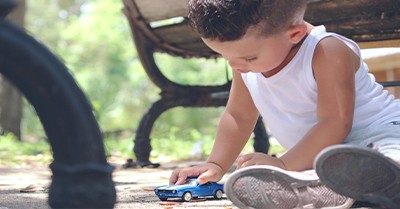Independent play is a fantastic way for children to develop creativity, problem-solving skills, and confidence. The following article provides information on Benefits Of Independence Play, Practical Strategies To Encourage Independent Play, Why Do Children Struggle With Independent Play, Tips For Encouraging Independent Play, How Does Independent Play Change As Children Grow, Fostering Independent Play At Different Stages and more.
Benefits Of Independence Play
Independent play offers numerous benefits for children's development and well-being. Here are some key advantages:
- Encourages Creativity: Without external guidance, children explore their imagination freely, leading to more innovative thinking.
- Builds Problem-Solving Skills: When playing alone, kids learn to navigate challenges and find solutions on their own.
- Fosters Social Independence: It helps children become more confident in their abilities and less reliant on constant interaction with adults.
- Supports Emotional Regulation: Engaging in solo play allows children to process emotions and develop self-soothing techniques.
- Improves Focus & Attention: Without distractions, children can concentrate better on tasks, enhancing their ability to stay engaged.
- Gives Parents More Time: While children play independently, caregivers can focus on other responsibilities or enjoy a moment of rest.
Practical Strategies To Encourage Independent Play
- Create a "Yes Space": Set up a safe environment where your child can explore freely without constant supervision.
- Start Together, Then Step Away: Begin an activity with your child, then gradually move away to let them continue on their own.
- Provide Open-Ended Toys: Toys like blocks, magnets, or dolls encourage imagination and self-directed play.
- Limit Screen Time: Reducing screen exposure helps children engage more with their surroundings and play independently.
- Incorporate Play into Daily Activities: Let your child "help" with simple household tasks, turning them into playful learning experiences.
- Gradual Separation: Start by sitting nearby while your child plays, then slowly move farther away over time.
- Set a Routine: Establish a daily independent playtime so it becomes a regular habit.
- Offer Simple Prompts: Give your child an open-ended idea like "Can you build a tall tower?" or "What kind of adventure is your toy going on?"
- Praise Their Efforts: Acknowledge when they play alone, reinforcing the behavior positively.
- Use a Timer: Set a short timer for independent play, gradually increasing the duration.
- Make It Fun: Turn solo play into an exciting challenge, like pretending they’re a scientist or explorer.
Why Do Children Struggle With Independent Play
Children may struggle with independent play for several reasons, including developmental stages, personality traits, and environmental factors. Here are some common challenges:
- Attachment & Separation Anxiety: Some children feel uneasy when a caregiver isn't actively engaging with them.
- Lack of Practice: If a child is used to constant interaction, they may not have developed the ability to entertain themselves.
- Overstimulation: Too many toys or distractions can make it hard for a child to focus on self-directed play.
- Fear of Failure: Some children hesitate to play alone because they worry about "doing it wrong."
- Need for Social Interaction: Certain personalities thrive on social engagement and may find solo play less appealing.
Tips For Encouraging Independent Play
Encouraging independent play can help children develop creativity, problem-solving skills, and confidence. Here are some effective strategies:
- Start with "Special Play Time": Spend a few minutes playing with your child each day, letting them lead the activity. This builds their confidence to play independently later.
- Create a Play-Friendly Environment: Set up a space with open-ended toys like blocks, dolls, or art supplies that encourage imagination.
- Gradually Increase Play Time: Use a timer to set short independent play sessions, gradually extending the duration as your child becomes more comfortable.
- Limit Screen Time: Reducing digital distractions helps children engage more deeply in self-directed play.
- Encourage Problem-Solving: Avoid stepping in immediately when your child faces a challenge—let them figure things out on their own.
- Be a Responsive Parent: Providing emotional support and predictable routines helps children feel secure enough to play independently.
How Does Independent Play Change As Children Grow
Independent play evolves as children grow, adapting to their developmental needs and abilities. Here's how it typically changes over time:
- Infants (0-12 months): Babies begin exploring their surroundings through sensory play, such as grasping objects, shaking rattles, or watching movement.
- Toddlers (1-3 years): They engage in solitary play, experimenting with toys and simple activities like stacking blocks or scribbling.
- Preschoolers (3-5 years): Imaginative play becomes more prominent, with children creating stories, role-playing, and engaging in pretend scenarios.
- Early School Age (5-7 years): Independent play includes more structured activities, such as puzzles, building projects, and solo games.
- Older Children (8+ years): They develop hobbies, engage in self-directed learning, and enjoy independent creative pursuits like writing, drawing, or coding.
Fostering Independent Play At Different Stages
Here are some ideas for fostering independent play at different stages:
- Infants (0-12 months): Provide sensory toys like rattles, soft blocks, and mirrors to encourage exploration.
- Toddlers (1-3 years): Offer simple activities like stacking blocks, playing with dolls, or engaging in pretend play.
- Preschoolers (3-5 years): Encourage imaginative play with dress-up clothes, storytelling, and role-playing games.
- Early School Age (5-7 years): Introduce structured activities like puzzles, building projects, and solo games.
- Older Children (8+ years): Support hobbies such as drawing, writing, coding, or independent reading.
Further Reading
Encouraging IndependenceLet's Walk Together
Supporting Children's Sense Of Agency
Activity Ideas To Support MTOP Outcome 1







 As an Educator in Australia, your pay rate falls under the Children’s Services Award 2010. This award states the minimum amount that an employer can
As an Educator in Australia, your pay rate falls under the Children’s Services Award 2010. This award states the minimum amount that an employer can When working as a qualified Early Childhood Teacher (with a university degree) within a service, your rate of pay will come from the Educational Services
When working as a qualified Early Childhood Teacher (with a university degree) within a service, your rate of pay will come from the Educational Services When working as a Diploma Qualified Educator your pay rate is from the Children's Services Award 2010. This Award states your minimum rate of pay
When working as a Diploma Qualified Educator your pay rate is from the Children's Services Award 2010. This Award states your minimum rate of pay When working as a Cert 3 Qualified Educator, your pay rate is from the Children's Services Award 2010. This Award states your minimum rate of
When working as a Cert 3 Qualified Educator, your pay rate is from the Children's Services Award 2010. This Award states your minimum rate of Educational Leaders play a crucial role in their early childhood service by ensuring that the educational program aligns with best practices and supports the holistic
Educational Leaders play a crucial role in their early childhood service by ensuring that the educational program aligns with best practices and supports the holistic In early childhood education and care, ratios are more than a technicality—they are a frontline safeguard. Every child deserves responsive supervision, emotional connection, and developmental
In early childhood education and care, ratios are more than a technicality—they are a frontline safeguard. Every child deserves responsive supervision, emotional connection, and developmental With the new national child safety reforms kicking in on 1 September 2025, early childhood services like yours have a real opportunity to lead the
With the new national child safety reforms kicking in on 1 September 2025, early childhood services like yours have a real opportunity to lead the Here’s a comprehensive Mobile Phone and Smart Watch Policy tailored for early childhood education and care (ECEC) services in Australia, aligned with the latest 2025
Here’s a comprehensive Mobile Phone and Smart Watch Policy tailored for early childhood education and care (ECEC) services in Australia, aligned with the latest 2025 The Sea of Fish Challenge is a national initiative that invites children, educators, families, and communities to create and display fish artworks as a symbol
The Sea of Fish Challenge is a national initiative that invites children, educators, families, and communities to create and display fish artworks as a symbol Across the early childhood education and care sector, educators are sounding the alarm: current staffing ratios are insufficient to deliver safe, meaningful, and developmentally appropriate
Across the early childhood education and care sector, educators are sounding the alarm: current staffing ratios are insufficient to deliver safe, meaningful, and developmentally appropriate


